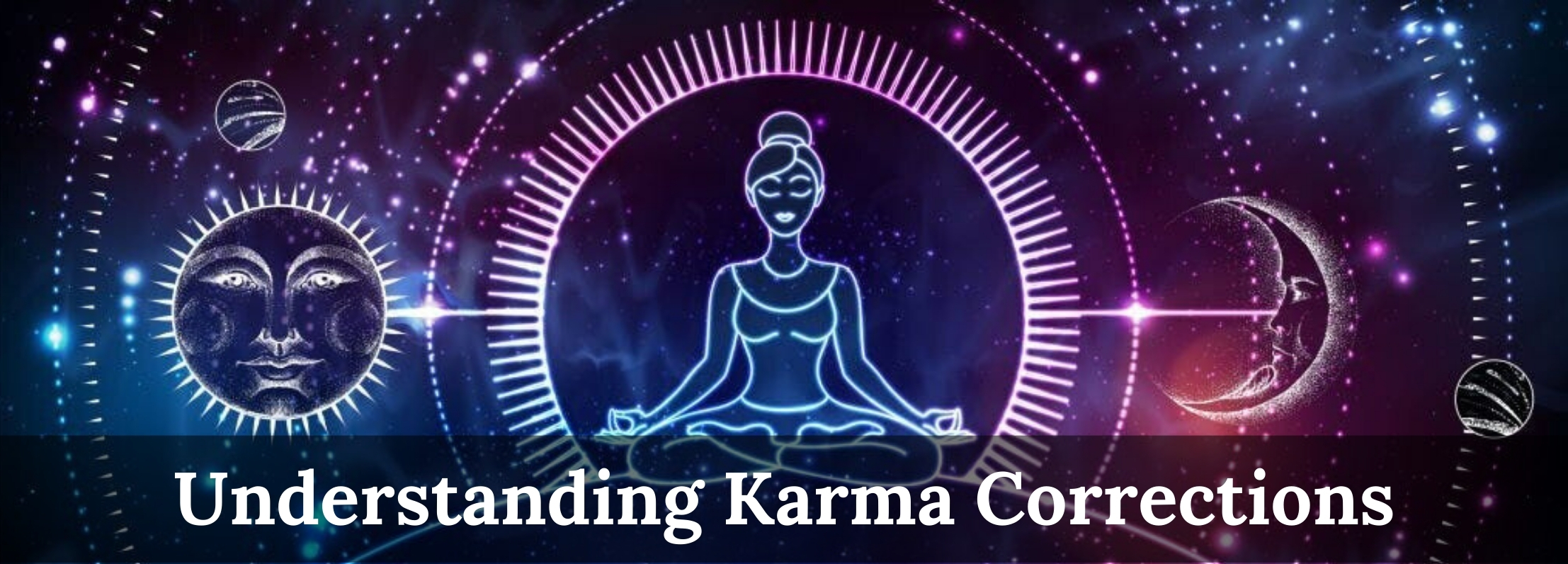


Astrology Services
Second Marriage
Child Adoption Astrology
Corporate Astrology
Financial Astrology
Political Astrology
Love Specialist Astrologer
Love Marriage Astrology
Spell Specialist And Spell Caster
Birth Child Analysis
Why All Problems To Me?
Astrology Is True Or False
Love Horoscopes
Powerful Love Spells
Kundli Doshas & Remedies
Vedic Astrology
Numerology Service
Vastu Consultants
Specialist
Delay in Marriage
Life Partner Prediction
Post Marriage Counseling
Right Career Selection
Job or Business
Govt. Job Prediction
Birth Time Correction
Children Astrology
Vastu For Commercial
Share Market
New Business Ideas
Bussiness Failure Reasons
Karma Corrections
Parent Child Relationship

Karma correction is the process of understanding and addressing past actions and their consequences to bring about personal and spiritual growth. It involves recognizing the karmic patterns that influence our lives and making conscious efforts to rectify negative karma through positive actions, intentions, and spiritual practices. The goal of karma correction is to realign oneself with a higher purpose and achieve a state of balance and harmony.
Understanding karma is crucial for personal growth because it provides insight into the underlying causes of our experiences and challenges. By acknowledging the impact of our actions on our present and future, we become more mindful of our behavior and its effects. This awareness fosters a sense of responsibility and empowers us to make positive changes, leading to a more fulfilling and purposeful life.
Karma, a concept originating from ancient Indian philosophy, refers to the law of cause and effect where every action has a corresponding reaction. It is believed that our thoughts, words, and deeds create energy that influences our future experiences. Positive actions generate good karma, leading to favorable outcomes, while negative actions result in bad karma, causing challenges and suffering. Understanding this principle helps individuals navigate life with greater awareness and intentionality.
Karma is a central tenet in Hinduism, Buddhism, Jainism, and Sikhism, each offering unique interpretations and practices related to karma and its correction. Historically, the concept of karma has shaped cultural norms and ethical conduct in societies influenced by these religions. It encourages moral behavior and the pursuit of spiritual enlightenment, emphasizing the interconnectedness of all beings and the impact of one's actions on the collective well-being.
Karma correction is guided by several key principles:
In karma correction, both intention and action play crucial roles. Positive intentions set the foundation for positive actions, which in turn generate good karma. However, it is not enough to have good intentions; they must be followed by concrete actions that reflect those intentions. Consistently aligning thoughts, words, and deeds with virtuous principles is essential for effective karma correction.
Various rituals and spiritual practices can aid in karma correction. These may include prayer, chanting, and participation in religious ceremonies. Such practices help individuals connect with their higher selves, seek divine guidance, and cleanse negative energy. Rituals often involve symbolic acts of purification and renewal, reinforcing the commitment to positive change and spiritual development.
Karma correction promotes significant personal and spiritual growth. By becoming more aware of one's actions and their consequences, individuals develop greater self-discipline, moral integrity, and emotional resilience. This growth leads to a deeper understanding of oneself and a stronger connection to one's higher purpose.
As individuals work on correcting their karma, they often experience improved relationships and overall well-being. Positive actions and intentions foster trust, respect, and harmony in relationships. Additionally, reducing negative karma alleviates stress and emotional burdens, contributing to better mental and physical health.
Practicing karma correction can be challenging due to deeply ingrained habits and unconscious behaviors. It requires consistent effort, self-reflection, and a willingness to change. Some common challenges include:
There are several misconceptions about karma and its correction that need to be addressed:
Many individuals have successfully corrected their karma and experienced profound changes in their lives. For example, a business executive who struggled with unethical practices and guilt decided to adopt ethical standards and engage in philanthropy. Over time, he noticed improvements in his personal life and professional reputation, illustrating the transformative power of karma correction.
Another case is of a woman who faced repeated relationship failures. After consulting a spiritual guide and practicing forgiveness and compassion, she healed past wounds and formed a loving, healthy relationship. These examples highlight the tangible benefits of addressing and correcting negative karma.
Individuals who have embarked on the journey of karma correction often share their positive experiences. One testimonial reads, "Through mindfulness and acts of service, I have transformed my life. I feel more at peace and connected to my purpose." Another individual shares, "Practicing forgiveness and self-awareness has improved my relationships and overall well-being. I am grateful for the guidance I received."
Karma correction is a vital practice for personal and spiritual growth. By understanding and addressing past actions, individuals can transform their lives, improve relationships, and realign with their higher purpose. The principles and methods of karma correction, such as meditation, acts of service, and spiritual practices, provide a pathway to balance and harmony.
Embarking on the journey of karma correction requires commitment and effort but offers profound rewards. It is an opportunity to cleanse negative energy, cultivate positive actions, and achieve a fulfilling and purposeful life. By embracing the principles of karma correction, individuals can create a better future for themselves and those around them. Start your journey today and experience the transformative power of karma correction.
1. Karma correction is the process of understanding and addressing past actions and their consequences to foster personal and spiritual growth.
2. Karma, the law of cause and effect, means that our actions, thoughts, and intentions create energy that influences our future experiences, impacting our life's outcomes.
3. Key principles include self-awareness, positive intention, compassion, responsibility, and forgiveness.
Methods include meditation and mindfulness practices, acts of service and charity, and rituals and spiritual practices.
Benefits include personal and spiritual growth, improved relationships, better well-being, and realignment with life's purpose.
Copyright © Comely Enterprises Pvt. Ltd. All Rights Reserved.


